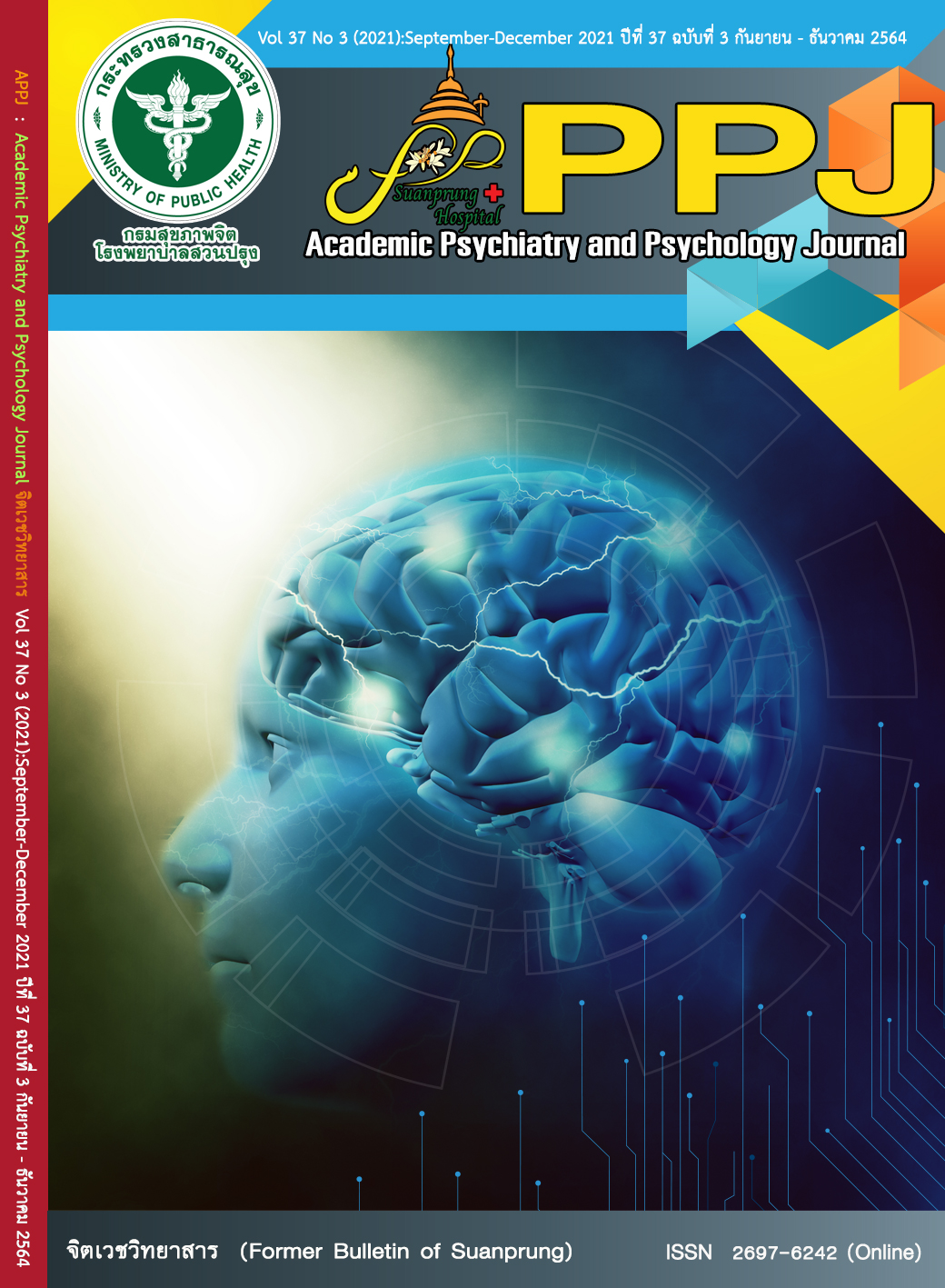Association between Medication Discontinuation and Re-hospitalization in Schizophrenia Patients in Khon Kaen Rajanagarindra Psychiatric Hospital: Matched Case-Control Study
Main Article Content
Abstract
Objectives: The study was to analyze the association between medication discontinuation and re-hospitalization in schizophrenia patients at Khon Kaen Rajanagarindra Psychiatric Hospital.
Materials and Methods: It was a matched case – control study, by using the secondary data from Electronic Medical Record of Khon Kaen Rajanagarindra Psychiatry Hospital, fiscal years 2015-2019. The study sample was 300 schizophrenic patients. The study group consisted of 150 schizophrenic patients (F20.0-F20.9) who re-hospitalized within 180 days. The control group consisted of 150 schizophrenic patients who did not re-hospitalize within 180 days. Gender and age ±2 years were matched. The association was analyzed by multivariable conditional logistic regression. The association was presented by Adjusted Odds Ratio (ORadj), 95% confidence interval.
Results: Family income, potential of caregivers, and duration of illness were controlled in the final equation, It was found that the medication discontinuation was associated with re-hospitalization among schizophrenic patients in Khon Kaen Rajanagarindra Psychiatric Hospital with statistical significance (p-value < 0.05). The patients with medication discontinuation were 2.0 times more likely to re-hospitalize than those with medication continuation (OR adj = 2.0, 95%CI; 1.15 - 3.47) (p=0.013).
Conclusion: Medication discontinuation was associated with re-hospitalization in schizophrenic patients in Khon Kaen Rajanagarindra Psychiatric Hospital.
Article Details
บทความหลังผ่านการปรับแก้จากกองบรรณาธิการแล้ว เป็นลิขสิทธ์ของวารสารจิตเวชวิทยาสาร โรงพยาบาลสวนปรุง กรมสุขภาพจิต กระทรวงสาธารณสุข ห้ามเผยแพร่เพื่อประโยชน์ทางการค้าโดยไม่ได้รับอนุญาต แต่อนุญาตให้เผยแพร่บทความดังกล่าวเพื่อประโยชน์ทางการศึกษาแก่ประชาชนทั่วไป ทั้งนี้กองบรรณาธิการไม่จำเป็นต้องเห็นด้วยกับบทความหรือข้อคิดเห็นใดๆ ที่ปรากฏในวารสารสวนปรุง
References
Kittiratanapaiboon P, Silpakit P. Systematic innovation development work plan for the creation mental health enhancement. Chiang Mai: Suanprung Psychiatric Hospital; 2017. (in Thai)
World Health Organization (WHO). The world health statistics 2016: monitoring health for the SDGs. Geneva: WHO; 2016.
Keepers GA, Fochtmann LJ, Anzia JM, Benjamin S, Lyness JM, Mojtabai R, et al. The American Psychiatric Association practice guideline for the treatment of patients with schizophrenia. Am J Psychiatry [Internet]. 2020 [cited 2021 Jun 15];177:868-72. Available from: https://doi.org/10.1176/appi.ajp.2020.177901
Kittiratanapaiboon P, Tantirangsi N, Jutha W, Tanari A, Kwansanit P, Asanangkonchai S, et al. Psychiatric disorders and mental health problems: Thai mental health survey 2013. Nonthaburi: Department of Mental Health; 2016. (in Thai)
Ministry of Public Health. Department of Mental Health. Training participants' guide to accessing psychotic services and caring for mental illnesses for nurses/public health scholars. 5th rev.ed. Bangkok: Deena Media Plus; 2019. (in Thai)
Suttachit S. Common comorbid conditions in schizophrenia patients. Chiang Mai: Department of Psychology. Faculty of Medicine Chiang Mai University; 2017. (in Thai)
The World Health Organization. Schizophrenia [Internet]. 2019 [cited 2012 Jun 15]. Available from: https://www.who.int/news-room/fact-sheets/detail/schizophrenia
Millier A, Sarlon E, Azorin JM, Boyer L, Aballea S, Auquier P, et al. Relapse according to antipsychotic treatment in schizophrenic patients: a propensity -adjusted analysis. BMC Psychiatry [Internet]. 2011 [cited 2021 Jun 2];24:[about 9 screens]. Available from: https://bmcpsychiatry.biomedcentral.com/track/pdf/10.1186/1471-244X-11-24.pdf
Olivares MJ, Thirunavukarasu M, Kulkarni J, Zhang HY, Zhang M, Zhang F. Psychiatrists’ awareness of partial and nonadherence to antipsychotic medication in schizophrenia: results from an Asia-Pacific survey. Neuropsychiatry Dis Treat 2013;9:1163-70. doi: 10.2147/NDT.S49080. [Epub 2013 Aug 12]
Hui CLM, Honor WG, Lee EHM, Chang WC, Chan SKW, Chen ESM, et al. Long-term effects of discontinuation from antipsychotic maintenance following first-episode schizophrenia and related disorders: a 10 year follow-up of a randomised, double-blind trial. Lancet Psychiatry 2018;5:432-42. doi: 10.1016/S2215-0366(18)30090-7. [Epub 2018 Mar 15]
The National institute of Mental Health [Internet]. 2020. Retrieved from schizophrenia. Available from: https://www.nimh.nih.gov/health/statistics/schizophrenia.shtml
Kwansanit P, Srisurapanon M. An epidemiological measure to calculate the burden of schizophrenia in Thailand. J Mental Health of Thailand 2018;26:50-62. (in Thai)
Phanthunane P, Vos T, Whiteford H, Bertram M, Udomratn P. Schizophrenia in Thailand: prevalence and burden of disease. Popul Health Metr 2010;8:24. doi: 10. 1186/1478-7954-8-24.
Chi MH, Hsiao CY, Chen KC, Lee LT, Tsai HC, Lee IH, et al. The readmission rate and medical cost of patients with schizophrenia after first hospitalization – a 10-year follow up population-base study. Schizophr Res 2016;170:184-90. doi: 10.1016/j. schres.2015.11.025. [Epub 2015 Dec 8]
Üçok A, Kara IA. Relapse rates following antipsychotic discontinuation in the maintenance phase after first-episode of schizophrenia: results of a long-term follow-up study. Schizophr Res 2020;225:31-8. doi: 10.1016/j.schres.2019.10.015. [Epub 2019 Oct 22]
Chainu K, Thongsuk K, Phuhongthong M. Factors affecting relapse in patients with chronic schizophrenia, Ban Phai District, Khon Kaen Province. J Khon Kaen Provincial Public Health Office. 2019;1:16-24. (in Thai)
Bernardo M, Canas F, Herrera B, Dorado MG. Adherence predicts symptomatic and psychosocial remission in schizophrenia: naturalistic study of patient integration in the community. Rev Psiquiatr Salud Ment. 2017;10:149-59. doi: 10.1016/j.rpsm.2016 .04.001. [Epub 2016 Jun 10]

